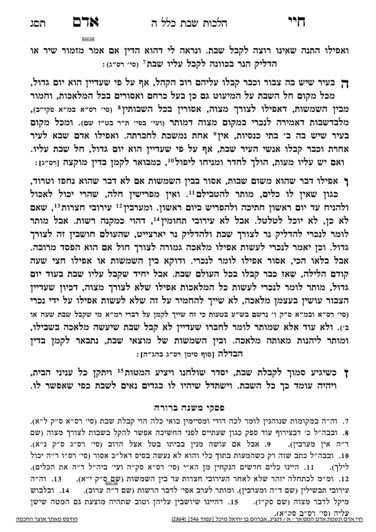We are continuing in siman 5, where we learned the idea that if the community accepts Shabbos early, it is binding on all individuals in that community. We also learned Rav Moshe’s caveat that it only applies if the community accepted Shabbos early for the purpose of the mitzvah, and not just for convenience.
The Chayei Adam continues, and writes that the kabbalah of the community is more stringent than the kabbalah of an individual. If an individual accepts Shabbos early, they are allowed to perform issurei derabanan in situations of a mitzvah or a significant need during bein hashmashos. When the community accepts Shabbos early, even issurei derabanan are assur and it is more stringent than even bein hashmashos (where those things are permitted).
However, the Chayei Adam gives one leniency for a community who accepted Shabbos early. They are allowed to perform amira l’achum for a mitzvah during bein hashmashos. It is considered a lower level derabanan, since the Jew is not performing the melacha himself. We will discuss this point further at a later time.
The Chayei Adam clarifies that if there are two or more distinct kehillos in the community, one kehillah accepting Shabbos early does not impact the other group, even if the kehilla which made early Shabbos is the larger group. The Piskei Mishnah Berurah points out that this does not apply to a non-permanent minyan in a house, but only to a distinct kehillah.
Finally, the Chayei Adam adds that these halachos are binding on a guest as well. If a guest comes into the city after the community has already accepted Shabbos, he can continue to travel until he reaches a safe place, and let his muktzah items fall down (e.g., a money belt), or shake them out (e.g., a wallet), without handling them. There are other scenarios in which a person may be allowed to continue walking with muktzah items and shake them out, as we will discuss when we learn about muktzah.
Thus, he is using this idea of the tzibbur accepting Shabbos to understand the contradiction in the Shulchan Aruch (S0118), where in one place he writes that Chazal did not prohibit issurei derabanan after accepting tosefes Shabbos, and in another place, he writes they did prohibit them. One answer may be that when the tzibbur accepted tosefes Shabbos, issurei derabanan are assur, but when the tzibbur did not accept early Shabbos, or the concept of the tzibbur collectively accepting Shabbos does not apply, one may perform issurei derabanan even during bein hashmashos (under the conditions discussed above).
Summary
When the tzibbur collectively accepts early Shabbos, it prohibits anyone from performing issurei derabanan, even those which would be permitted during bein hashmashos, (except amira l’achum), as opposed to when an individual accepts early Shabbos.
In order for a community to accept early Shabbos in a way that is binding on all members of the community, it must be that there is only one central kehillah in the community, and, according to Rav Moshe, that they are doing so for the purpose of the mitzvah. Once they have done so, it is binding on all members, including guests.
If a guest walks into the city after they have accepted Shabbos, he may shake off his muktzah items in a safe place.



